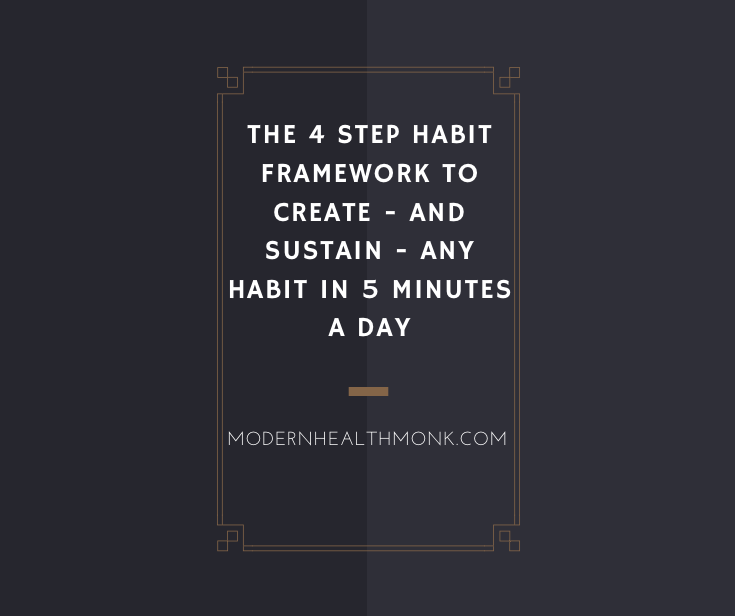
The 4 Step Habit Framework To Create – And Sustain – Any Habit In Less Than 5 Minutes a Day
“How the heck do I go from meditating once, to meditating every day?”
Or, for that matter, how do I go from eating more plants once a week, to every day?
How do I get myself to go from taking a ten minute walk, to taking a ten minute walk regularly?
I know that if I do this stuff more regularly, I’ll see dramatically better and different results.
But HOW on earth do I become the kind of person that actually can do this stuff?
One of the big problems is that we spend lots of time asking silly questions like “which diet or form of meditation do I try?” rather than focusing on the real secret sauce of success: actually doing it and changing our behavior.
At the end of the day, whether or not we’re saying it, we struggle most with changing our actual behavior – whether habits of thought or habits of action.
This four-part “Master The Day” habit change framework will show how to become the kind of person to reach the levels of health (and success) that you want.
The Four Part “Master the Day” Habits System
If you ask me, the ultimate question (and research backs this up regarding “why all diets fail”) is really this:
“How do I DO all the stuff I KNOW will make me healthier and happier? I already know what to do… I just can’t seem to get myself to do it.”
We all struggle with certain bad habits, whether they are patterns of thinking, like:
- “I always fail, so why bother even trying?”
- “My mom/dad was like this, so I’m probably out of luck.”
- “With the economy the way it is, I’ll never get a new job or promotion.”
Sometimes they’re health-related habits like:
- Emotional eating and binge eating
- Smoking to relieve stress
- Choosing to work extra or “take just this day off” rather than doing that 20 minute walk or yoga routine
And sometimes they’re just life and personal habits, like:
- Being dirty and disorganized, leaving things all over our desk or house
- Mentally being stressed out, overwhelmed, and taking on too much
- Being quick to criticize others (or ourselves)
And at the end of the day, these are all habits of thought and action. The good news? We can change them. Yup, all of them.
But ultimately nothing can change unless we KNOW what’s not working, we have a PLAN to execute, we REVIEW our progress, and we CHECK IN regularly to see what we’re actually doing and if it’s working.
In fact, I have a robust system of personal development to ingrain new habits to bring me to the level I want to be in life. It includes daily, weekly, monthly, and yearly systems to help assess my habits: are they crafting me into the kind of person I want to be spiritually, physically, happiness-wise, financially, relationally, and more?
So here’s what that entails and how you can do it.
Step #1: The Morning Routine & Written Focus
I’ve tried a HUGE variety of different methods for trying to ingrain certain key behaviors and habits (like regular meditation to off-set working lots of hours), and by far, and I mean by far, nothing has worked as well as doing things first thing in the morning.
Now some of you might be groaning going, “Ugh, I have to get up earlier? C’mon Alex…”
Think about it: it makes logical sense.
After work? Too tired.
Late at night? Definitely not happening.
Middle of the day? Busy.
Morning… jackpot.
I don’t get up at 5 am. In fact, I don’t even really get up that early. I get up an hour earlier than normal, which means around 6:45/7 am before going to work at 9 am. Doable, right?
And here’s the first step in changing ANY habit.
I write down what’s not working, and what outcome I want.
Example:
- “Problem: I’m stressed to the point of nervous breakdowns 3/7 days a week. What I want is to meditate 20 minutes a day to have that calm.”
- “Problem: I feel and look crappy. I want to lose ten more pounds.”
And then I put this on paper. And I review that paper first thing in the morning. What’s the goal? What’s the burning desire? What do you really want?
Along with the first step of writing down what you want, the second step is to write down what potential daily habits can get you there.
Here’s what that looks like:
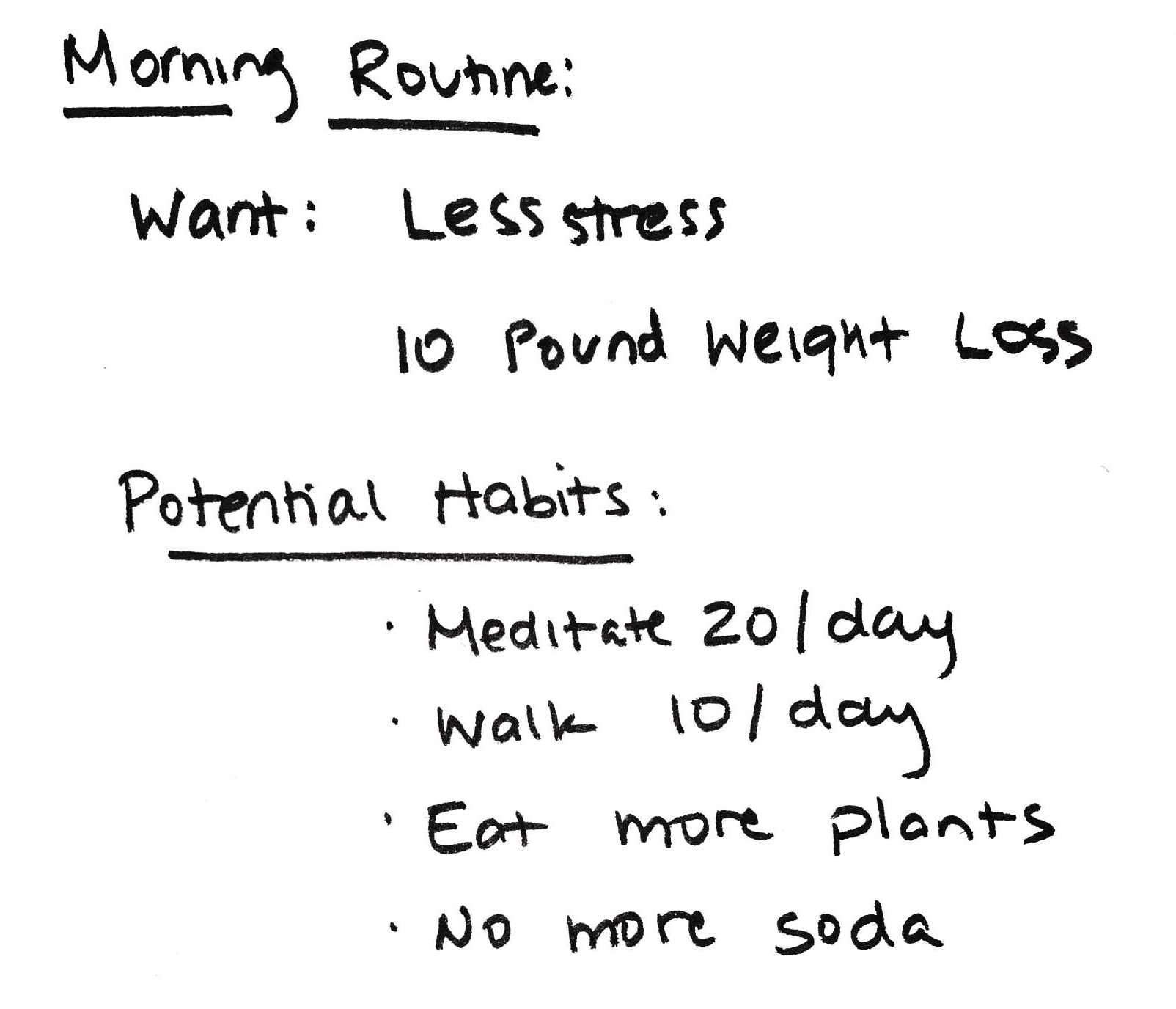
So it’s great that we want some magical outcome – but it starts to become a reality when we actually put pen to paper to think about what daily, tiny actions need to happen over the days, weeks, months and years to make that a reality.
Step #2: The Daily Checkin
The next step is the daily check-in.
Hands down, there is nothing more effective for getting healthy or improving your life than some kind of daily accountability. And the daily check-in is a way to do that without relying on other people or external programs.
So here’s what it looks like.
In step #1 you figured out your target goal, e.g. lose 10 pounds, including the potential daily habits that will get you there.
Now each week you list a few simple habits – these shouldn’t be stretch goals, they should be easy. So easy it almost seems pointless. And here’s what you do with these few habits.
You whip out a piece of white paper when you get to your office on Monday morning (or wherever you spend most of your time during the week).
And you create a few columns for the days of the week, and on the left you list your few tiny habits like this:
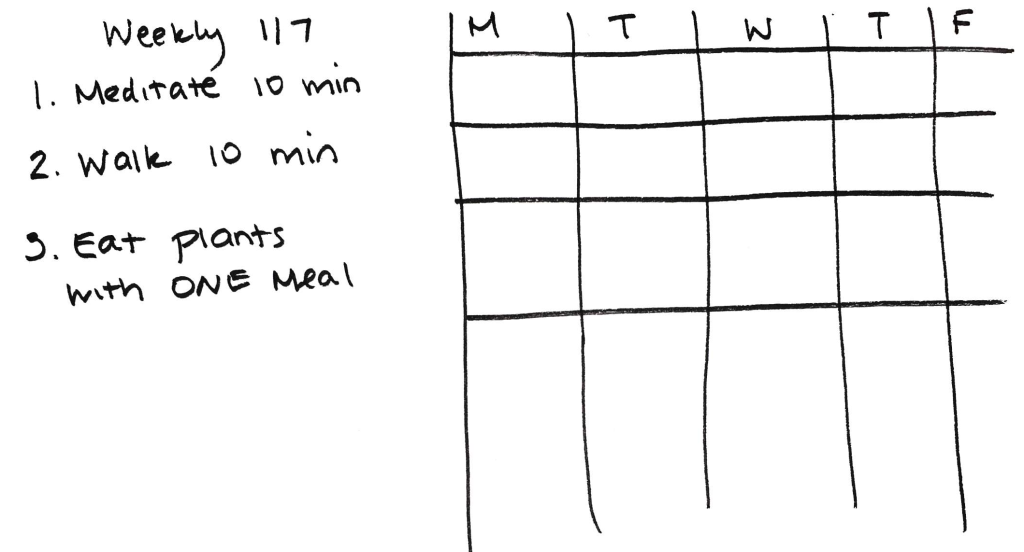
And then you track the daily habit as your day goes along. “Did I do those 10 minutes? Did I eat this thing? Did I avoid that thing?”
You just put a check mark if you did the habit, and you don’t put anything if you didn’t.
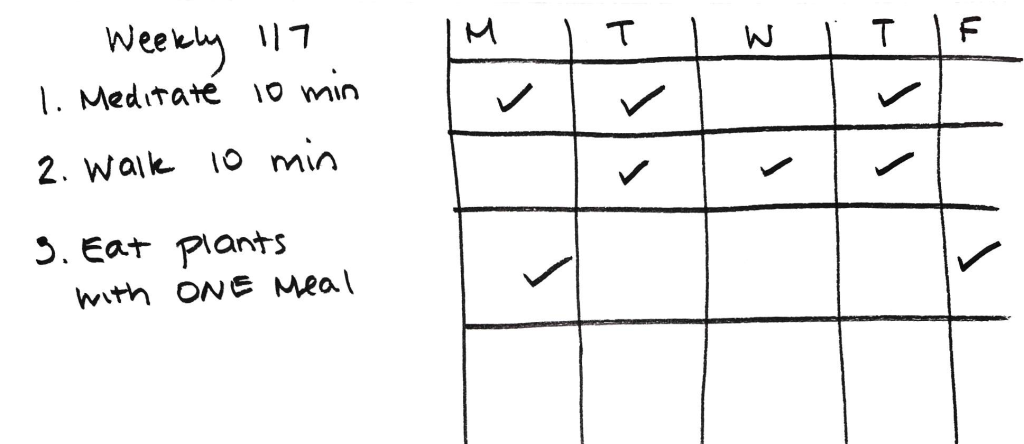 You leave this at your desk (or wherever you spend 40 hours a week 9-5) so you have 24/7 feedback, and you’re constantly reminded throughout the day about what new habits you are working on ingraining into your life.
You leave this at your desk (or wherever you spend 40 hours a week 9-5) so you have 24/7 feedback, and you’re constantly reminded throughout the day about what new habits you are working on ingraining into your life.
Step #3: The Weekly Review
The third step of this process is you need to review what worked. And what didn’t.
So you tally up the scores of those check marks or those lack of check marks. What worked? What didn’t? How many times a week did you do all the stuff you said you were going to do?
Let’s say we use the following scores just for this example:
- Meditation: 3/5: 60%
- Walk 10 minutes a day: 3/5: 60%
- Eat plants with one meal: 2/5: 40%
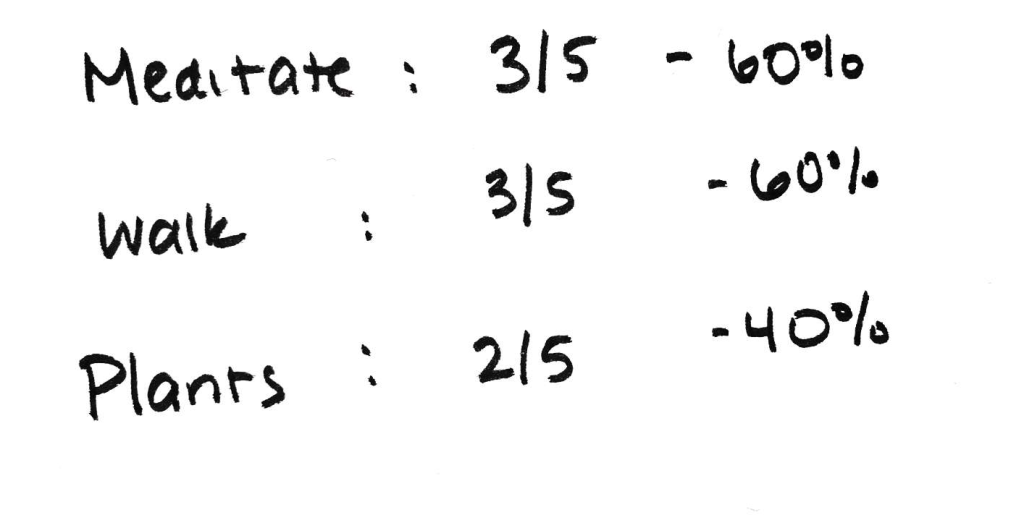 So now you know – in real time – how often you’re doing these habits, and what’s not working.
So now you know – in real time – how often you’re doing these habits, and what’s not working.
Then, list what why things didn’t work.
So if you said you only ate plants 2/5 days… why was that?
Do you hate plants?
Do you not know how to cook them?
Do they just freak you out?
You need to know why something didn’t work in order to cultivate a NEW habit that’ll help things work for you. This entire reflection process is absolutely critical to making things work. Because if things don’t go well, and you didn’t re-evaluate to know why they didn’t go well, nothing will change next week.
Finally, you use these insights to figure out the habits for next week.
Step #4: What New Habits Need to Happen This Week
Okay… now what’s important is not what’s going wrong, or what’s going right, but WHY things aren’t working. E.g. if we say “I didn’t meditate 5x a week like I said I would,” that’s fine.
But what new habits do you need to create to actually do that?
That’s what goes on the sheet this week.
So let’s take a look at last week’s habits.
- Meditation. I only did it 60% of the time because I realized i’m usually too tired at the end of the day.
- Potential new habit: Do it the first 10 minutes of my lunch break.
- Walking. I only did it 60% of the time because I usually go during the evening but now it’s winter, and it’s freezing so I don’t really want to go outside.
- Potential new habit: Do it in the morning when it’s a bit warmer, or try it immediately after work.
- Eating plants. I only did it 40% of the time because I don’t know how to cook plants and I hate the taste.
- Potential new habit: Put the plants in a smoothie with honey and lots of fruits, so it tastes sweet but you’re still eating plants. Plus, with the smoothie it’ll take you less than five minutes a day, and no cooking is required.
Makes sense?
By building in the habit of reflection, we figure out what habits just aren’t working – why – and then what new habits we need to implement that actually work for us.
What potential new habits you want to cultivate:
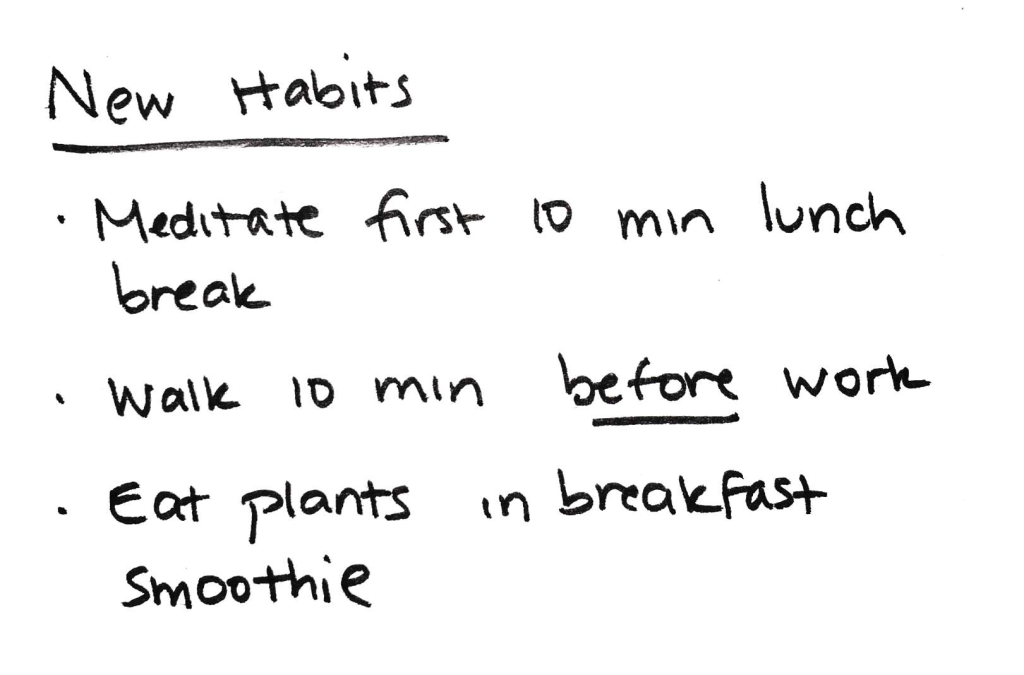
And then finally, those become your habits for next week:
The Ultimate Life Transformation System
This single method has transformed my life more than virtually anything else.
Whatever you want, whether it’s health, financial, happiness, or spiritually-related, it’s about habits. Habits are standing between where we are, and where we want to be.
And habits are the quickest, most effortless path to get there. No matter what needs changing, you can follow this four part framework to cultivate new habits so that after 52 weeks – a year – you won’t even recognize yourself.
The best part? If you pick simple habits, you can improve multiple aspects of your life at once, like your health with your happiness, plus your career, and your relationship.
It only takes five minutes a day, so what do you have to lose?
Using This “Master The Day “Philosophy for Weight Loss & Health
The Real Food Weight Loss Tribe is built on this exact same framework. Each month we have a live masterclass or a special guest, every few days I post updates in our private community to help you stay focused and accountable, and each week you get a private newsletter with a tiny habit to help you stay accountable and focused.
This framework is build on this Master The Day habits philosophy – so that no matter what you want to change, you have the daily, weekly, and monthly accountability to make this year the best year ever.
The tribe isn’t currently open, but you can join the wait list here.
– Alex

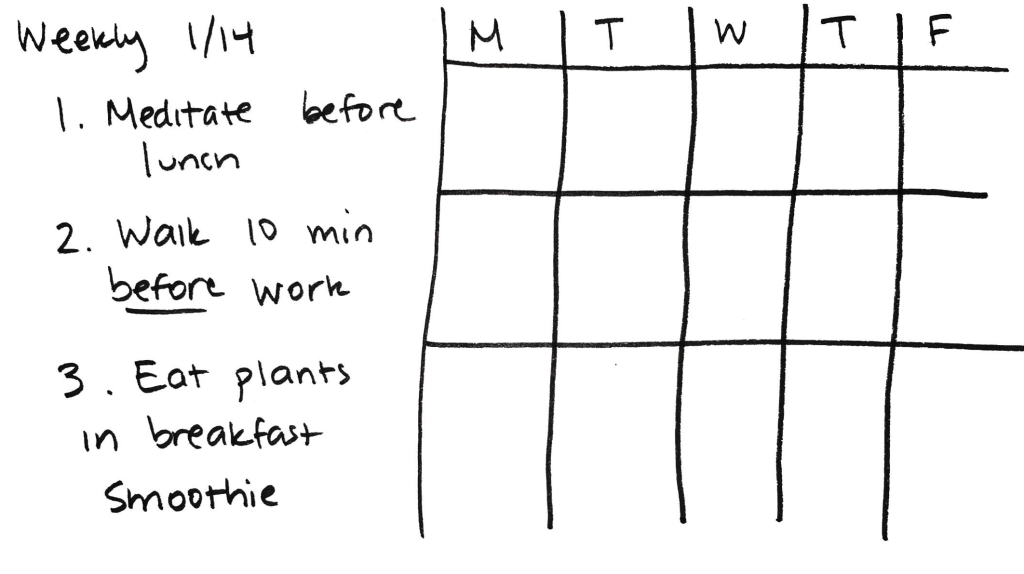
Thank u
Cheers Ruth!
Brilliant Alex, and as usual spot on.
I’m going to try this this week to overcome the over stressed, overwhelmed, not having a great time feeling which I know seems to affect every aspect of my life when I feel like this.
If I change how I feel about things or work out a structured way to manage all my current life’s swings and roundabouts better, things can only improve, which will mean my mood will improve, my coping mechanisms as a ridiculously busy full time mum, (also working and constantly having things to do) will improve, my overall health( constant colds and feeling run down, not as fit as I’d like to be and sore knees) can be the best it can be, so that I can really feel great, make time for myself without guilt and no longer end up doing what I feel I have to rather than what I need, and be able to tell people honestly when they ask how I am that I really am great thank you!
Thank you for this! I love it!
Hi Nic!
Definitely let me know how it goes for you – this in-depth habit change program has dramatically improved my life in so many ways, beyond just health. Can’t wait to see how it goes for you –
– Alex
Thank you. This was fabulous.
Glad it helped Ava 🙂
I really want to buy your book! Does it only come in E-Book form?
Hi Skylar,
It’s in print in about 2-3 weeks 🙂 I’ll be sure to send you an email.
-Alex
I read this article after watching the video “Million Dollar morning habits” at youtube. This makes real sense. I have been trying to lift a huge load of routine to start with and have been failing for the past 6-8 months. Thanks a lot. I will start out right away with the Four part habit framework. I will keep you posted on my progress. Keep rocking bro!!
Good luck Gladwin, very happy it helped